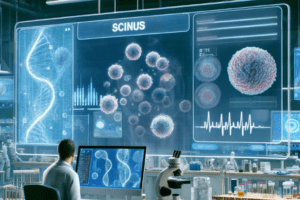Bioprocess control and continuous process improvement are crucial for the evolving field of cell therapy development and bioreactors. Combination of the current control and optimization technologies with the latest computer-based strategies will accelerate the path forward, providing a way to improve bioprocesses further. Artificial intelligence (AI) emerged as a data-driven technique which is becoming increasingly relevant in exploring the full potential of cell therapy and personalized medicine. [1]
Leveraging AI’s ability in data analysis, pattern recognition, and predictive modelling, the biotech industry is witnessing great advancements. Traditionally, bioprocesses required precise manual monitoring and intervention. With AI tools, these processes can be streamlined and drastically enhanced by analyzing big datasets in real-time, enabling automated adjustments to parameters such as temperature, pH levels, and nutrient supply. AI algorithms can adaptively regulate oxygen levels based on the metabolic state of the cells, promoting their proliferation while minimizing stress-induced damage. This not only reduces the margin of error but also accelerates the pace of experimentation and production. Cell, or even organoid cultures can be automated in terms of plating, passaging, media exchanges, monitoring, treatment with compounds and the end point assays with high content image analysis. During culture, cells can be monitored using transmitted light with immediate analysis of phenotypic changes, including inhibition of growth or spheroid disintegration using technologies such as process analytical technology (PAT). [2,3]
Furthermore, AI facilitates bioprocess modelling, allowing scientists to simulate and optimize complex cellular behaviours. By integrating data from multiple sources, including genomic profiles and environmental factors, AI-driven models provide valuable insights into cell growth dynamics and metabolic pathways. This enables researchers to fine-tune bioprocess parameters, leading to higher yields and improved product quality. Moreover, AI can analyze historical data to identify trends and anomalies, facilitating predictive maintenance and mitigating the risk of equipment failures. [4]
SCINUS is already making great progress by actively participating in various projects focused on next-generation sensor technology. These initiatives aim to enhance the capabilities of the SCINUS bioreactor NG, by acquiring even more precise and comprehensive data. With the integration of advanced sensor technology and the assistance of AI, we can fine-tune and optimize the processes for cell expansion.
In conclusion, the integration of AI in bioreactors and cell therapy development kickstarts a new chapter of innovation in the biotech industry. This synergy between technology and intelligent analysis holds great potential for driving further advancements in biotechnology and accelerating progress towards improved medical treatments and therapies.

References
[1] Cheng, Yang, et al. “Artificial intelligence technologies in bioprocess: opportunities and challenges.” Bioresource Technology 369 (2023): 128451.
[2] Oksana Sirenko, Angeline Lim, Astrid Michlmayr, Zhisong Tong, Emilie Keidel, Felix Spira. Automation of 3D cancer spheroid assay for compound screening [abstract]. In: Proceedings of the American Association for Cancer Research Annual Meeting 2024; Part 1 (Regular Abstracts); 2024 Apr 5-10; San Diego, CA. Philadelphia (PA): AACR; Cancer Res 2024;84(6_Suppl):Abstract nr 2060.
[3] Aguilar-Gallardo, Cristobal, and Ana Bonora-Centelles. “Integrating Artificial Intelligence for Academic Advanced Therapy Medicinal Products: Challenges and Opportunities.” Applied Sciences 14.3 (2024): 1303.
[4] Ondracka, A., Gasset, A., García-Ortega, X., Hubmayr, D., van Wijngaarden, J., Montesinos-Seguí, J. L., … & Manzano, T. (2023). CPV of the Future: AI-powered continued process verification for bioreactor processes. PDA Journal of Pharmaceutical Science and Technology, 77(3), 146-165.
With the integration of advanced sensor technologies and the assistance of AI, SCINUS can fine-tune and optimize the processes for cell expansion.
